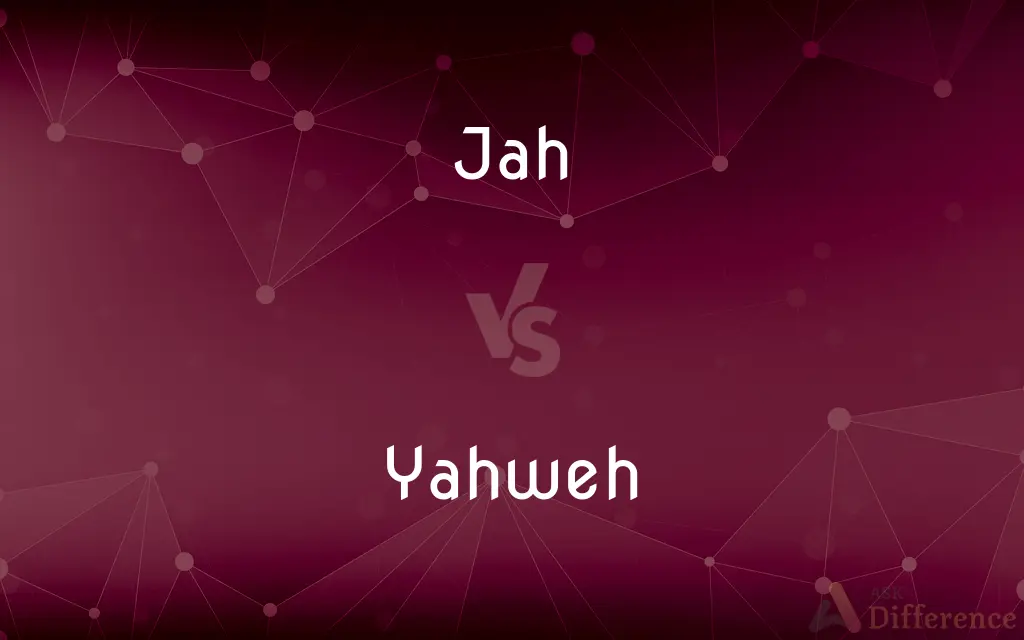Jah vs. Yahweh — What's the Difference?
Edited by Tayyaba Rehman — By Fiza Rafique — Updated on March 30, 2024
Jah is a shortened form of Jehovah, used in Rastafarianism to refer to God, emphasizing a personal, direct relationship. Yahweh is the biblical name of God in Judaism, denoting a sacred, covenantal relationship with the Israelites.

Difference Between Jah and Yahweh
Table of Contents
ADVERTISEMENT
Key Differences
Jah, often used within Rastafarianism, represents a personal and direct connection to the divine, reflecting an intimate aspect of God that is accessible and omnipresent in the life of the believer. This term symbolizes liberation and a spiritual connection to Africa, particularly Ethiopia, seen as the promised land. On the other hand, Yahweh is the specific name given to God in the Hebrew Bible, associated with the Israelites' covenantal relationship with God. It represents a profound, unique relationship between God and His chosen people, characterized by promises, laws, and historical guidance.
While Jah is embraced in the context of Rastafarian belief, which combines elements of Christianity, African traditions, and pan-Africanism, Yahweh is central to Jewish theology and worship, rooted in ancient Semitic traditions. The use of Jah in Rastafarianism also reflects a resistance against colonial and oppressive structures, whereas Yahweh's worship is tied to Jewish ritual, law, and the history of Israel as a nation.
The term Jah is part of a modern religious movement that emerged in the 20th century, emphasizing the overthrow of oppressive systems and envisioning a return to an African Eden. Conversely, Yahweh has ancient origins, with the name being revealed to Moses in the context of liberating the Israelites from Egyptian bondage, signifying a deep historical and spiritual legacy.
Jah is often mentioned in reggae music and Rastafarian prayers, symbolizing God's presence in the struggles for justice and freedom. Yahweh, however, is invoked in Jewish prayers, scripture, and rituals, reflecting a reverence for God's holiness and the historical covenant with Israel.
The use of the name Jah reflects a syncretic blend of Christianity and African diaspora traditions, signifying a god who is both a liberator and a source of empowerment. Yahweh, in contrast, is approached with a sense of awe and reverence, embodying the sacred history and laws given to the Jewish people, with His name being so sacred that it is often not spoken aloud, replaced in reading by Adonai.
ADVERTISEMENT
Comparison Chart
Origin
Rastafarianism, 20th century
Judaism, ancient Semitic traditions
Significance
Personal, direct relationship with God
Covenantal relationship with the Israelites
Context
Liberation, return to Africa
Sacred history, laws, and guidance
Cultural Roots
Christianity, African traditions
Ancient Israelite religion
Representation
Oppression resistance, empowerment
Awe, reverence, and historical covenant
Usage in Worship
Reggae music, prayers
Jewish prayers, scripture, rituals
Theological Focus
Personal liberation, empowerment
Holiness, sacred law, and covenant
Compare with Definitions
Jah
A name for God in Rastafarianism, emphasizing personal connection and liberation.
Rastafarians often chant Praise Jah for spiritual upliftment.
Yahweh
The biblical name of God in Judaism, central to Jewish worship and theology.
In the Torah, Yahweh reveals Himself to Moses and the Israelites.
Jah
Symbolizes resistance against oppression and a link to African heritage.
Jah is seen as a guiding force towards freedom and justice.
Yahweh
A name so sacred it is often not spoken aloud, replaced with Adonai.
When reading the Torah, Jews say Adonai instead of Yahweh.
Jah
Represents a source of empowerment and spiritual presence.
Through prayer to Jah, Rastafarians seek guidance and strength.
Yahweh
Associated with the historical and spiritual legacy of the Jewish people.
Yahweh's guidance of Israel through history is a key theme in Judaism.
Jah
Used in reggae music to express spiritual and political messages.
Many reggae songs include praises to Jah for strength and guidance.
Yahweh
Represents God's unique covenantal relationship with Israel.
Yahweh's promises to Abraham establish a chosen people.
Jah
Reflects the Rastafarian belief in God's direct intervention in human affairs.
Followers believe Jah will lead them back to the promised land.
Yahweh
Invoked in religious rituals, emphasizing holiness and reverence.
Jewish prayers often reference Yahweh's sacred deeds for Israel.
Jah
Jah or Yah (Hebrew: יָהּ, Yāh) is a short form of יהוה (YHWH), the four letters that form the tetragrammaton, the personal name of God: Yahweh, which the ancient Israelites used. The conventional Christian English pronunciation of Jah is , even though the letter J here transliterates the palatal approximant (Hebrew י Yodh).
Yahweh
Yahweh was the national god of Ancient Israel. His origins reach at least to the early Iron Age and likely to the Late Bronze Age.
Jah
A biblical form of the name of God (Yahweh), used especially in Rastafarianism.
Yahweh
A name for God thought to represent the original pronunciation of the Tetragrammaton among the ancient Hebrews.
Jah
Jehovah.
Yahweh
A modern transliteration of the Hebrew word translated Jehovah in the Bible; - used by some critics to discriminate the tribal god of the ancient Hebrews from the Christian Jehovah. Yahweh or Yahwe is the spelling now generally adopted by scholars.
Yahweh
A name for the God of the Old Testament as transliterated from the Hebrew consonants YHVH
Common Curiosities
What does Jah signify in Rastafarianism?
Jah signifies a personal and direct connection to the divine, emphasizing liberation and empowerment in Rastafarian belief.
Can Jah and Yahweh be considered the same entity?
While Jah and Yahweh refer to the concept of God, their representations, contexts, and significances differ in Rastafarianism and Judaism, respectively.
What role does Yahweh play in Jewish history?
Yahweh plays a central role in Jewish history as the God who led the Israelites out of Egypt, established a covenant with them, and guided them through historical challenges.
Is the worship of Jah and Yahweh similar?
Worship practices differ significantly; Jah worship incorporates elements of reggae and a focus on personal liberation, whereas Yahweh worship involves traditional Jewish rituals and prayers.
Why is Yahweh a significant name in Judaism?
Yahweh is significant because it represents the unique and covenantal relationship between God and the Israelites, central to Jewish worship and theology.
How do Rastafarians view Jah in relation to Africa?
Rastafarians view Jah as symbolizing a spiritual return to Africa, particularly Ethiopia, seen as the promised land and a source of liberation.
How do beliefs about Jah and Yahweh differ?
Beliefs about Jah emphasize personal empowerment and resistance against oppression, while beliefs about Yahweh focus on holiness, sacred law, and a historical covenant with the Jewish people.
What makes the name Yahweh unique in religious practice?
Yahweh's uniqueness lies in its sacredness, being so revered in Jewish practice that it is not spoken aloud, reflecting a deep sense of holiness and reverence.
How is Jah expressed in culture?
Jah is often expressed in reggae music and Rastafarian prayers as a symbol of resistance, liberation, and a spiritual connection to Africa.
What are the origins of Jah and Yahweh?
Jah originates from Rastafarianism, a 20th-century movement, while Yahweh has ancient origins within Judaism and its sacred texts.
Share Your Discovery

Previous Comparison
Love vs. Doting
Next Comparison
Castle vs. TempleAuthor Spotlight
Written by
Fiza RafiqueFiza Rafique is a skilled content writer at AskDifference.com, where she meticulously refines and enhances written pieces. Drawing from her vast editorial expertise, Fiza ensures clarity, accuracy, and precision in every article. Passionate about language, she continually seeks to elevate the quality of content for readers worldwide.
Edited by
Tayyaba RehmanTayyaba Rehman is a distinguished writer, currently serving as a primary contributor to askdifference.com. As a researcher in semantics and etymology, Tayyaba's passion for the complexity of languages and their distinctions has found a perfect home on the platform. Tayyaba delves into the intricacies of language, distinguishing between commonly confused words and phrases, thereby providing clarity for readers worldwide.
















































